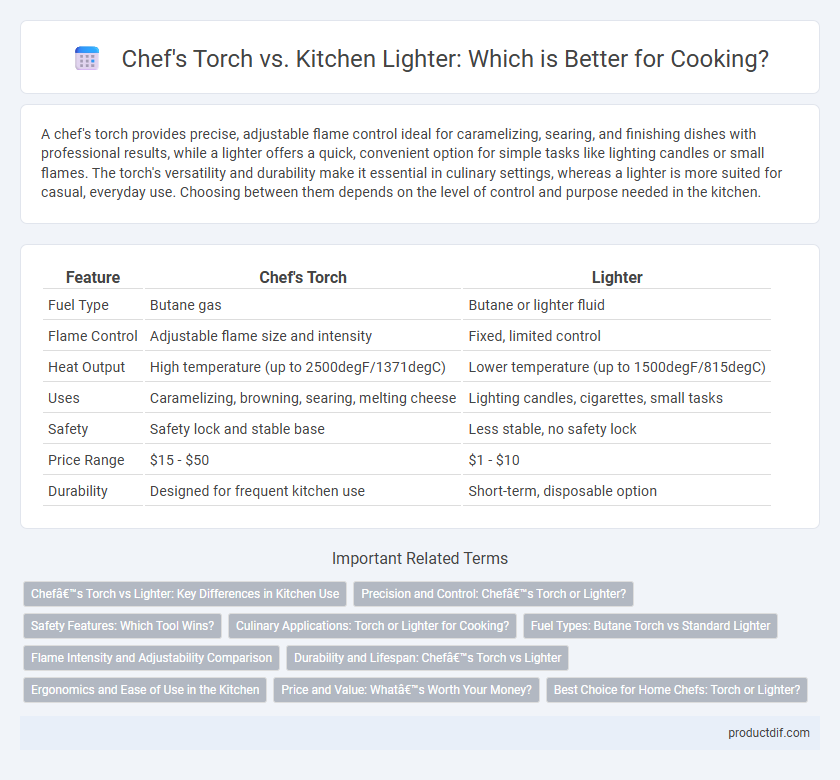A chef's torch provides precise, adjustable flame control ideal for caramelizing, searing, and finishing dishes with professional results, while a lighter offers a quick, convenient option for simple tasks like lighting candles or small flames. The torch's versatility and durability make it essential in culinary settings, whereas a lighter is more suited for casual, everyday use. Choosing between them depends on the level of control and purpose needed in the kitchen.
Table of Comparison
| Feature | Chef's Torch | Lighter |
|---|---|---|
| Fuel Type | Butane gas | Butane or lighter fluid |
| Flame Control | Adjustable flame size and intensity | Fixed, limited control |
| Heat Output | High temperature (up to 2500degF/1371degC) | Lower temperature (up to 1500degF/815degC) |
| Uses | Caramelizing, browning, searing, melting cheese | Lighting candles, cigarettes, small tasks |
| Safety | Safety lock and stable base | Less stable, no safety lock |
| Price Range | $15 - $50 | $1 - $10 |
| Durability | Designed for frequent kitchen use | Short-term, disposable option |
Chef’s Torch vs Lighter: Key Differences in Kitchen Use
Chef's torches offer precise, high-temperature flames ideal for caramelizing sugar, roasting peppers, and melting cheese, while lighters provide a less controlled flame primarily for lighting candles or grills. The chef's torch features adjustable flame sizes and fuel types like butane, ensuring consistent heat output and safety during culinary tasks. In contrast, lighters lack these specialized controls and durability for repeated kitchen use, making a chef's torch the preferred tool for professional and home cooks seeking accuracy and efficiency.
Precision and Control: Chef’s Torch or Lighter?
Chef's torches provide superior precision and control with adjustable flame settings tailored for culinary tasks such as caramelizing sugar or searing meats. Lighters lack flame adjustability and often produce inconsistent heat, making them less reliable for detailed cooking techniques. Professional chefs prefer torches for their ability to deliver focused, even heat essential for achieving perfect textures and flavors.
Safety Features: Which Tool Wins?
Chef's torches boast built-in safety features such as adjustable flame control, child-resistant ignition, and safety locks, reducing the risk of accidental burns or fires. Lighters often lack precise flame adjustment and safety mechanisms, increasing potential hazards during kitchen use. For culinary tasks requiring heat precision and safety, chef's torches provide superior protection and control compared to standard lighters.
Culinary Applications: Torch or Lighter for Cooking?
Chef's torches provide precise temperature control and intense, focused flames ideal for caramelizing sugar on creme brulee, roasting peppers, or finishing sous vide dishes, offering consistent culinary results. Lighters, while convenient for igniting stoves or grills, lack the adjustable flame intensity and safety features essential for intricate cooking tasks. For professional kitchens and serious home cooks, investing in a reliable chef's torch enhances cooking precision and efficiency far beyond the capabilities of a standard lighter.
Fuel Types: Butane Torch vs Standard Lighter
Butane torches use refined butane gas, producing a high-temperature, consistent flame ideal for culinary tasks like caramelizing sugar and searing meats, whereas standard lighters typically rely on lighter fluid or butane but deliver a lower and less stable flame. Butane torches offer adjustable flame control and longer burn times, enhancing precision in kitchen applications compared to the shorter flame duration and lower heat output of standard lighters. The purity of butane fuel in chef's torches ensures minimal odor and residue, maintaining food flavor integrity during cooking.
Flame Intensity and Adjustability Comparison
Chef's torches offer high flame intensity typically ranging from 1300 to 2500degF, enabling efficient caramelization, searing, and browning. Unlike lighters, which usually have lower, less controllable flames around 1000degF, chef's torches provide precise flame adjustability for varied cooking tasks. This adjustability ensures better control over heat application, making chef's torches superior for culinary precision and safety.
Durability and Lifespan: Chef’s Torch vs Lighter
Chef's torches are designed with durable materials such as stainless steel and reinforced nozzles, providing a longer lifespan compared to typical lighters made from plastic and basic metal components. The fuel capacity of chef's torches, often refillable butane, enhances their longevity, whereas disposable lighters need frequent replacement. High-quality chef's torches withstand frequent usage in professional culinary environments, ensuring sustained performance and reliability over time.
Ergonomics and Ease of Use in the Kitchen
Chef's torches feature ergonomic handles designed for comfortable, extended use, reducing hand fatigue during precision tasks like caramelizing or searing. Unlike traditional lighters, they offer adjustable flame controls that provide consistent heat output for delicate culinary applications. Their larger size and safer ignition systems enhance ease of use and reduce accidents in busy kitchen environments.
Price and Value: What’s Worth Your Money?
Chef's torches range from $20 to $120, offering precise flame control for caramelizing, roasting, and searing, making them an excellent investment for culinary enthusiasts. Lighters are considerably cheaper, typically under $10, but lack the durability and intensity needed for professional kitchen tasks. While lighters may suffice for occasional use, a chef's torch delivers superior value by combining versatility, power, and long-term reliability.
Best Choice for Home Chefs: Torch or Lighter?
A chef's torch offers precise flame control and higher temperatures ideal for caramelizing, searing, and finishing dishes, making it the best choice for home chefs seeking professional-quality results. Unlike standard lighters, which provide less consistent heat and smaller flames, torches ensure even cooking and safety features designed for culinary use. Investing in a chef's torch enhances versatility and efficiency in the kitchen, surpassing the limitations of a traditional lighter.
Chef’s Torch vs Lighter Infographic

 productdif.com
productdif.com